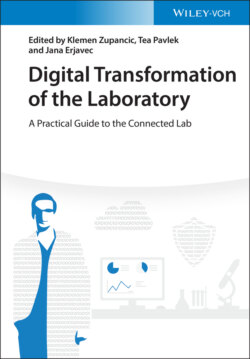Читать книгу Digital Transformation of the Laboratory - Группа авторов - Страница 23
1.2.5.2 Quantum Computing and the Lab of the Future
ОглавлениеThe field of quantum computing is moving so fast that any review or update is soon superseded by the next breakthrough [73]. Consequently, this section focuses on introducing some of the concepts of quantum computing and how it might impact the LotF [74] and its workflows going forward especially those in the design (model/predict) and analyze stages.
Quantum computers differ [75] from our current classical computers in that they offer a fundamentally different way of performing calculations; they use the theories of quantum mechanics and entanglement [76, 77] and qubits (multiple simultaneous states) rather than bits (binary states – 0 and 1). This gives them the potential to solve problems and process tasks that would take even the fastest classical computer hundreds if not thousands of years to perform. Such performance will enable the simulation of highly complex systems, such as the behavior of biological molecules and other life science challenges [78]. A key concept in this area is that of the “quantum supremacy” [79] threshold, where quantum computers crossover from being an interesting and pure research‐driven project to doing things that no classical computer can. Quantum supremacy is defined as a situation where a quantum computer would have to perform any calculation that, for all practical purposes, a classical computer cannot do because of the time involved. There is much discussion about whether we have reached “quantum supremacy,” but it does seem clear that, for the foreseeable future, quantum computers will not be used for everyday activities but for highly specific, truly value‐adding and accelerated tasks, much in the same way that exascale supercomputers work today. One further critical step will be needed to ensure that quantum computers are able to operate outside the research domain, that is to create quantum compilers [80] which can make code run efficiently on the new hardware, just as traditional compilers were needed with classical computers.
There are good parallels between quantum computers and the exascale, supercomputers, and clusters of today when thinking about the impact on life science and broader research. There are limited numbers of supercomputers at the moment due to their cost and the skills needed to fully utilize them. Consequently, researchers have to bid for time slots at the regional and national centers which house them. It is likely that the same process will happen with quantum computers, with regional/national [81–83] centers being established to support scientists who use them remotely to process their calculations and model building. Quantum cloud computing [84] and associated services will likely evolve in the same way that existing cloud compute and storage infrastructure and business models have evolved over the past decade.
We now focus on how quantum computing will more directly impact the LotF and the experiments which will run within it. The researchers involved will, at least in the early years, have to balance their “classical” and “quantum” calculation time with their physical experiment effort to help drive their insights and decision‐making. Experiments will still be performed on complex systems, but they will be influenced even more by the work done in silico. There will likely be more rapid experiment cycles since the ability to perform quicker calculations will enhance the speed of progress and encourage research in areas that have until now been hard to explore, for example molecular simulations of larger biological entities.
Data will remain a key element of the workflow. Being able to send data to quantum computers and to retrieve the outputs from them quickly will help to influence the next experiment. However, with the rarity of quantum computing, careful planning of the holistic workflow of the data and compute will be needed to ensure best efficiency of location and data pipelines. There will be an even greater need to maintain the large volumes of data necessary for the calculations “close” to the compute power to avoid large delays in moving data around. The timelines for the impact of quantum computing remain uncertain as the jump from research to production ready is hard to judge. Not every LotF will have a quantum compute facility nearby, but in time they will be able to access this accelerator technology more readily to support their key processes. Unarguably, quantum computing will be a very exciting area for life science and will create a whole new era of scientific exploration.
